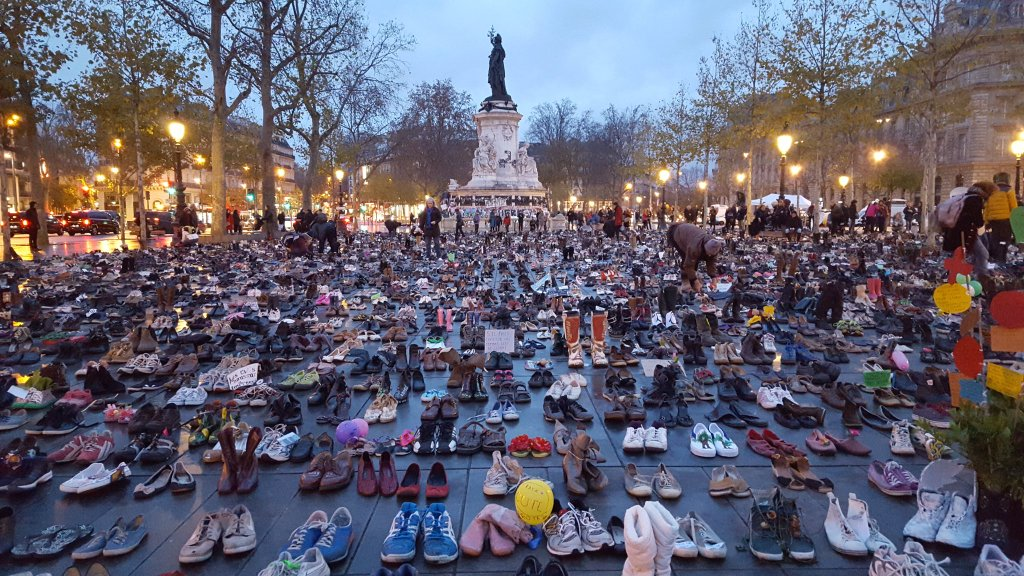Will Paris be PM Modi's Biggest Foreign Policy Challenge Yet?
Shoes replace people in what would otherwise have been a Peoples March for Climate Change in Paris

PARIS: For a Prime Minister who is projecting himself as a global leader, Narendra Modi's visit to Paris for Climate Change negotiations is being seen as his toughest challenge so far.
A day before the beginning of the COP 21 summit in Paris, more than 7,20,000 people across more than 2,600 locations in the world marched in unity, demanding a transition to clean energy and climate justice. The massive global turnout, the highest ever on the issue of climate, has made it to the front pages of most major newspapers in the world and has set the tone for the negotiations in Paris.
"The charge from the streets for leaders to act on climate has been deafening, with record numbers turning out across the world. Over 7,20,000 people are calling with one voice for global leaders to deliver a 100% clean energy future at the Paris climate summit. Despite events being cancelled across France, global actions were larger than last year's massive march in New York, breaking records in Bangladesh, Australia, Britain and more," says Emma Ruby-Sachs from Avaaz.
The Global Climate March was scheduled to take place in the Paris, where 400,000 were expected, but was cancelled by the state authorities following the terror attacks. As a response, Avaaz laid out 22,000 shoes donated by citizens unable to take to the streets in the French capital. Plants, notes, messages in the shoes reminded the world of the stake that citizens have in climate change, and the strong campaign that the peoples groups have been waging for years in a bid to pressure governments to take the right action. The Pope, actress Marion Cotillard and designer Vivienne Westwood were among those who left their footwear along with messages of support.
The last six months have seen world leaders like Barack Obama, Angela Merkel and other members of the G7 succumb to civil society pressure, committing to a full transition to 100 percent clean energy.
In effect, this means now the spotlight is on India who have so far been refusing to commit to a timeline to decarbonise its economy. As India insists on its demand of a fair deal - where the historical polluters take a bigger chunk of the financial responsibility that the transition would entail - developed countries are already calling India a possible challenge.
For Prime Minister Modi, it comes down to making a choice between being a global hero that people on the streets want on him to, or return from Paris as a deal blocker.
In India too, more than 40 climate events took place which saw more than 70,000 people participating - including 20,000 at the various Rahgiri events in Delhi, the great Indian Digital Climate March in Mumbai and various grassroot events in Rajasthan, Karnataka, Maharashtra, Madhya Pradesh, Telengana and Andhra Pradesh among others.
India, the third largest polluter in the world after US and China will have to tread cautiously in Paris. On one hand it needs space to develop and ensure every citizen gets access to power, on the other - it has the largest population of people who are vulnerable to the effects of Climate Change.
In an article in UK’s Financial Times PM Modi has said that it would be “morally wrong” for rich countries to shift the burden of reducing emissions to developing countries like India, in an indication that he was unlikely to budge from New Delhi’s stated position. "The principle of common but differentiated responsibilities should be the bedrock of our collective enterprise. Anything else would be morally wrong," he wrote.
"Justice demands that, with what little carbon we can still safely burn, developing countries are allowed to grow.
"The lifestyles of a few must not crowd out opportunities for the many still on the first steps of the development ladder," he added.
PM Modi is currently in Paris with leaders of 150 countries to attend the climate change meet.



